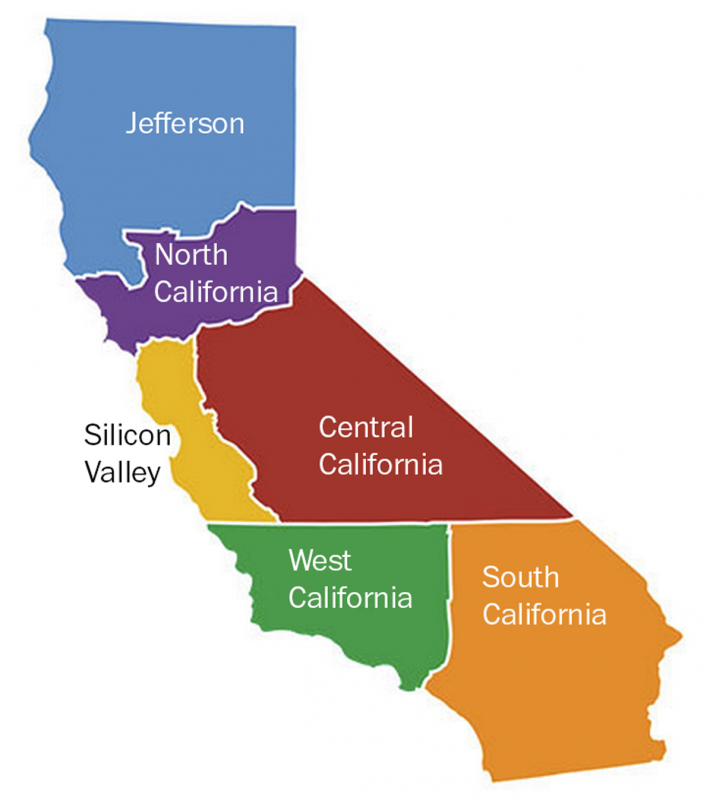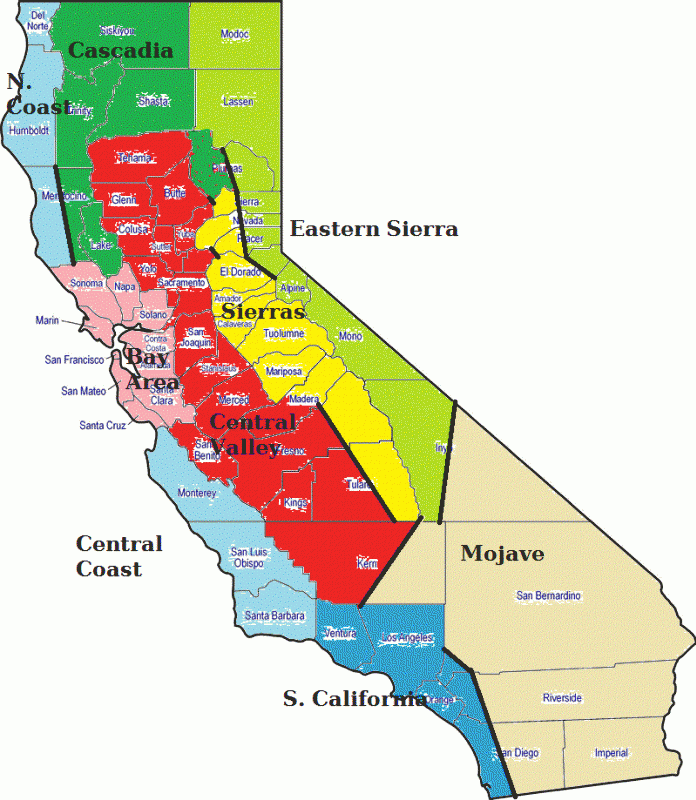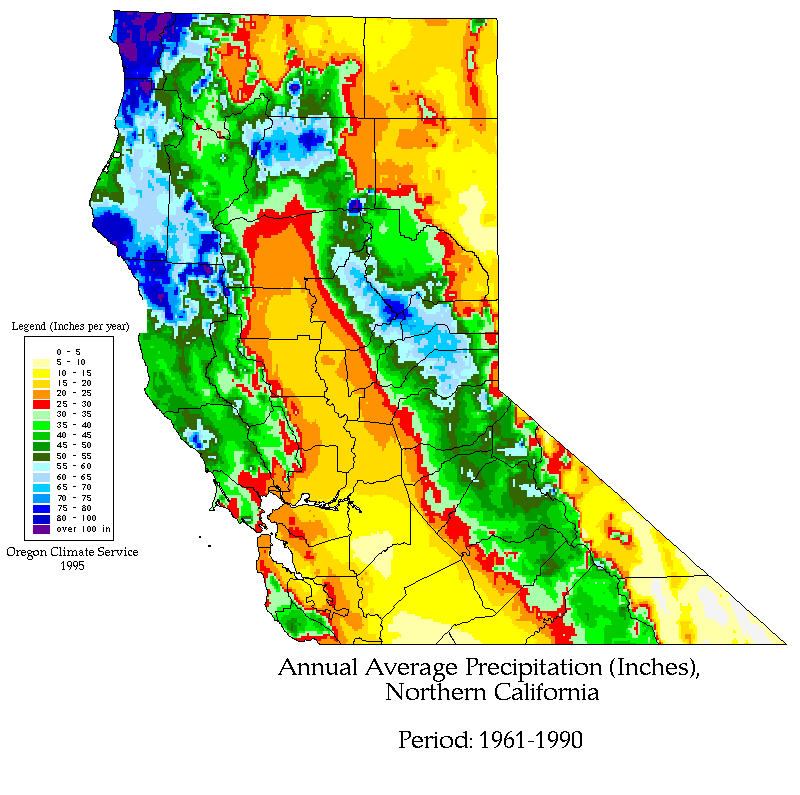It's not a fair system. It is exactly what the Founding Fathers feared. California isn't a Republic. It's an unhinged Democracy with the same failings as Athens, which was eventually destroyed by its insane voters denying reality and blaming their minority, the single largest failing of a Democracy. The system here has hurt millions over the decades and most people are so fed up by it that their goals are to have enough money to ignore it. The most common approach to acquiring wealth is to ignore politics and focus on business. This is why most voters are ignorant and only give passing notice to demogogues on TV ranting about how they should vote. This is an unstable and ineffective and destructive system, and it drives division and anger.
And so the state sometimes brew up interesting plans, like the one to divide California into 6 different states, based on county lines and general interests so fewer people have power over others completely different. Above is a proposed map, which I don't quite agree with. Here's my map and the explanation of why.
Bay Area should be the Bay Area Counties where people commute into the SF Bay to work. North California is stupid and needs to go. Sonoma County has nothing in common with Truckee or Sierraville. The Central Valley should have its own state because its interests are different from the Mountains. Owens River Valley deserves to belong to Eastern Sierra, which should run from the Mojave desert to Reno. And I would include Sacramento Valley to Red Bluff down to Bakersfield as one state because their interests are mostly agriculture and water for agriculture. The LA basin is largely aligned with San Diego and the Seaside Communities, but I'd put Santa Barbara in the same state as Monterey and San Luis Obispo and the Salinas Valley because they're tied together in a balance of Agriculture and rich land owners and mansions. The alternative is to associate the wine country areas with either agriculture or richer cities, meaning their interests become more about tourism and less about profits. Southern California needs to focus entirely on LA basin and coast, and its influence should end at the desert. South California should just be renamed Mojave should be the desert areas with its focus on water rights and agriculture, with its economic focus in Las Vegas. Most people just drive through on the way there, after all. When it gets too expensive to Fly, Vegas is DOOMED. And indian casinos are doing a great job of making Vegas less and less relevant. I don't think "Silicon Valley" deserves to be a state. It's all Bay Area and Bay Area problems. It should include Marin and Napa and Vacaville and Livermore and Santa Cruz and probably Monterey and Sonoma County, since people commute into SF for work. The Salinas Valley would be better served shifting into San Joaquin, and while San Joaquin and Sacramento Valleys are very similar in agricultural interests, one has water and the other has reservoirs but is mostly desert, so they're not quite the same. Jefferson's borders I pretty much agree with as is, though coastal redwoods and fishing isn't the same as chaparral ranching, but both areas are largely economically dependent on soon to be bankrupt pot farmers.
This means that Central California needs to run from Hwy 49 on the East over to the West side of the Salinas Valley, unless the residents there prefer to associate with the coast, since 101 runs through there to tie it together, and 101 doesn't close like 1 does. Coastal California might need to be 2 states, a Central Coast from Santa Barbara up to Pacifica, and a north coast from Stinson Beach up to the Oregon. Coastal cities are aligned over fishing and tourism. That's most of what they can do. They'll be pretty broke and spend most of their money on roads and emergency services for the tourists and locals so car wrecks aren't fatal. The SF Bay breaks it up and while there's a tiny fraction of fishing and a fair bit of port services on the Bay itself, its mostly sweat shops and rich people lording it over the poor. Not a nice place. I've lived there for the last decade and did not enjoy it at all. The biggest problem with Port Cities is immigration drives down wages and drives up rents, so people are violent cutthroats over the pressure. And they can't leave because the Valley dwellers kill them or scare them off. When I worked with green cards and new citizens, they were scared to death of travel outside their ghettos. They believed strongly that they would be killed, so they paid too much for rent, for food, and got paid too little for work, basically enhancing misery. And I had to work around that. Not nice. So SF Bay is a cesspit and needs to remain treated as such. The borders should conform to where people commute from, though I'm deliberately ignoring Tracy and Manteca and Stockton because gasoline prices and falling wages in the Bay Area make that less and less affordable all the time. And the ACE train over the Altamont Pass is expensive, too expensive for any but urban professionals to use, and why do they? Is that time so cheap?
The real reason to divide up California is the ethnic groups and interests are no longer able to work together. In pure voting power, large portions of California are completely ignored, in a similar way that the East Coast ignores the Flyover States. Dividing up the Ungovernable California into places which make sense locally is the right answer. And it makes sense more if it means that water rights get re-negotiated from the crimes they currently are into something a bit more fair. Owens Valley used to be fertile farmland like the Salinas Valley. Then LA stole their water and most of the "protected" land is dead now. LA is evil. And people are dying from the dust. That's murder, 2nd degree, but still murder.
It is likely that Sacramento and San Joaquin will take as much water as they can from their respective rivers to expand farmland, which will go back to killing the salmon and smelt that they could care less about because Salmon is for coastal fishermen. The central valley is all about truck crops and rice and orchards. They need the water, and those crops are worth $3-5 Billion dollars a year. Think about that. That's way more than Hollywood, which stripped of its votes and bully pulpit will be nicely helpless down in LA, which won't get all that easy water pumped over the hill from the Grapevine near Bakersfield. Boo hoo. I guess LA will have to invest in desalination and build the solar power and wind arrays to run them, and I am guessing it will cost a lot of money and stink really bad since LA dumps barely treated sewage into the ocean. Oops! I suspect that people might not want to live there when LA stops being a "miracle in the desert" and has to actually live within its means instead of exploit me and everyone else up north. FY, LA. FY hard.
In any case, the North Coast, which is mostly mountainous should probably be its own state. I'd probably set it up from Mendocino County up to the Oregon Border and Divide it from the East near I-5. I might include Redding in the state, but it might be smarter to put Redding with the eastern part running to the Nevada Border, since its mountains and central looking rather than coastal. That entire region needs industry to occupy its population, something more healthy than growing pot and brewing meth. Timber is mostly cut, and so heavily mechanized it didn't offer many jobs. Fishing is pretty well ruined due to the California Aqueduct near Tracy killing all the salmon since 1979. There's still some from local rivers, but sedimentation is so severe due to clear cuts that the rivers need to be restored and a lot of trees and erosion control needs to be planted, and the timber industry already got rich and bailed out, so why would they? The NW Sacramento Valley is in rain shadow.
See how dry the central valley is? Its completely dependent on irrigation water to grow crops. The upside to the lack of precipitation is your crops don't get ruined by rainfall growing mold and rotting the fruit or grain before you can harvest. These are ideal growing conditions, really. Farmers can make MONEY that way. The downside is that without a functional irrigation system managed fairly, farms can be shut off, bankrupted, and eaten by farmers with the money to bribe or control the water supply, so corruption and exploitation are a huge problem. These are called Water Wars for a good reason. Its not pie in the sky theoretical. It is ironic, but the proposed Jefferson's west side has too much water, and the East has too little. The obvious answer is to capture it in reservoirs and pump it east by aqueduct, however there are mountains in the way. And tunnels cost billions. The pumps also kill salmon since they follow the stream and once the water temp gets too high, they die. So moving the water is both energy intensive and destructive. And it gets worse. Without a significant drop in erosion in those NW mountains, the reservoir would fill with sediment before the dams and canals are finished being built. Its really that bad. So a project like that is actually doomed from the start, which is the primary reason it has never been done. There's also no geographic or material advantage to build industry there so nobody does. It is empty of value, and has too much rain and erosion. Sucks to be up there and getting its own state won't help. There isn't even reason for tourism so don't expect to pay for roads either. It will go back to the wild.
The most likely outcome of the above California division fantasies? No division. Things will stay the same. LA will protect its water by exploiting the North. The farmers will keep killing salmon because the North Coast doesn't have the votes to stop them. Farmers will also continue to attack immigration reform because illegals make them money. SF Bay needs San Joaquin water too, and the rest of the state will pay taxes to subsidize their abusive lifestyles. Things will largely continue.
And for every family fed up and leaving California for saner places, more will come to replace them. More suckers. California has great weather, but you pay and pay for that. Sensible divisions just won't happen. Isn't that sad?


